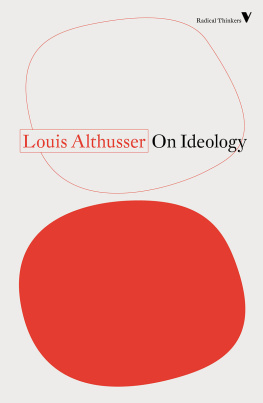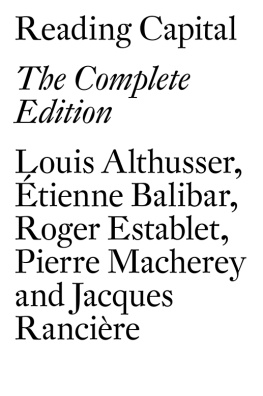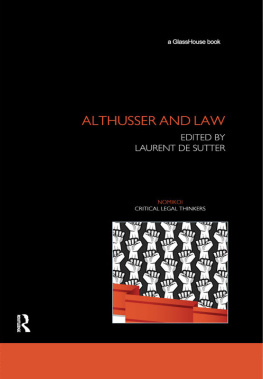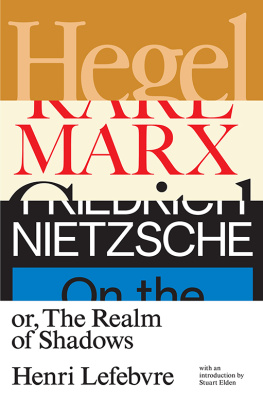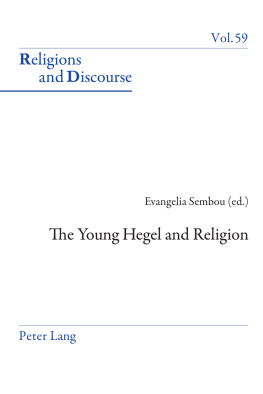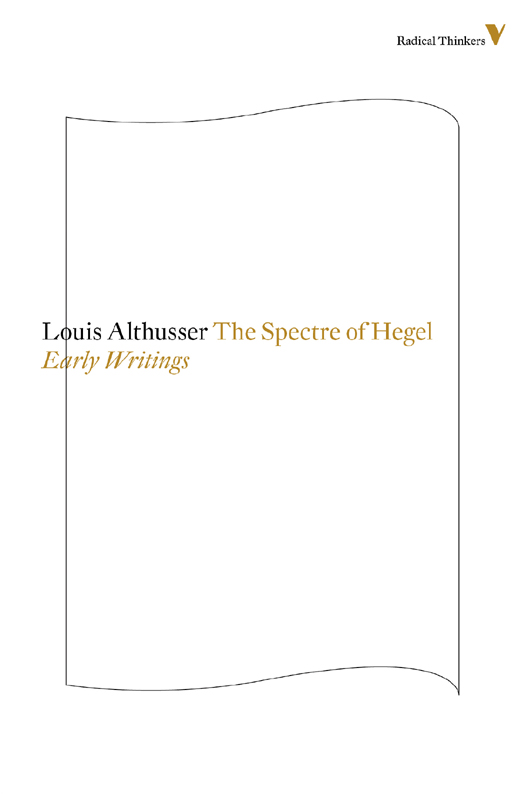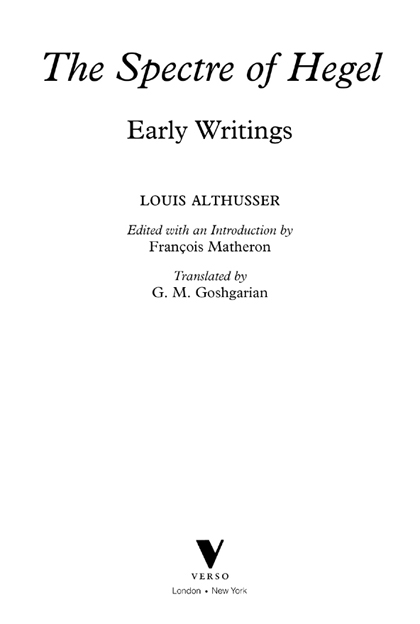This paperback edition published by Verso 2014
First published in English by Verso 1997
Verso 1997, 2014
Translation G. M. Goshgarian 1997, 2014
First published as crits philosophiques et politiques. Tome I
Stock/IMEC1994
All rights reserved
The moral rights of the authors have been asserted
Verso
UK: 6 Meard Street, London W1F 0EG
US: 20 Jay Street, Suite 1010, Brooklyn, NY 11201
www.versobooks.com
Verso is the imprint of New Left Books
ISBN-13: 978-1-78168-151-0
eBook ISBN: 978-1-78168-205-0
eISBN (UK): 978-1-78168-514-3
British Library Cataloguing in Publication Data
A catalogue record for this book is available from the British Library
Library of Congress Cataloging-in-Publication Data
A catalog record for this book is available from the Library of Congress
v3.1
Contents
4 The Return to Hegel:
The Latest Word in Academic Revisionism (1950)
Translators Note
The present English text is a translation of approximately the first half (pp. 7339) of Louis Althusser, crits philosophiques et politiques. Tome I (Stock/IMEC, 1994), containing comprehensive selections from Althussers published and unpublished texts of 194551, together with an essay entitled On Marxism, published in two parts in the Revue de lenseignement philosophique in 1953. On Marxism has been included because it marks the transition from the early to the mature Althusser, outlining a research programme that was to bear fruit in the path-breaking texts of the 1960s.
The editors original French introduction, translated here, was intended to introduce the whole of Vol. I of the crits philosophiques et politiques, which, as the introduction indicates, also includes a selection of unpublished texts from the 1970s and 1980s. The French preface, likewise translated in the present volume, is specifically devoted to the early writings.
In preparing these texts for publication, the editors have been guided by a twofold concern for readability and fidelity to the original texts. The usual emendations of minor slips or faulty punctuation have been made; occasional interpolations indispensable to a clear understanding of the text have been enclosed in brackets and placed in the body of the text. All passages the author has underlined for emphasis are set in italics; his capitalization has generally been respected. Many of Althussers longer paragraphs especially in the Letter to Jean Lacroix have, however, been divided.
Authors notes, marked with an asterisk, have been placed at the foot of the page, except in the case of the masters thesis, On Content in the Thought of G. W. F. Hegel, where they are extensive; here, to avoid overburdening the page, they have been numbered consecutively throughout the text and put at the end. The editors notes have been placed at the end of each text, except, again, in the case of the masters thesis, where they have been enclosed in brackets and included within the authors notes. Variant passages have been given in the notes when they seemed significant. To avoid placing notes within notes, the occasional editorial comment on a note has been placed in brackets and included in the note itself. Translators notes are indicated with superior letters and placed at the foot of the page throughout, except in the masters thesis, where they are marked with an asterisk.
Althussers bibliographical references have been systematically retained; errors have been silently emended whenever possible. When English translations of French or German works cited by Althusser could be found, the English-language references are given in brackets after the original reference. In the notes to the masters thesis on Hegel, the translator has also, as indicated at the beginning of the notes, provided references to standard German editions of works by Hegel or Marx which Althusser cites in French translation.
The translator thanks the following people for practical help, criticisms, and suggestions: Olivier Corpet, Alexandra Gruebler, Jane Hindle, Malcolm Imrie, Joseph McCarney, Franois Matheron, Markar Melkonian and Sandrine Samson. Special thanks to Gregory Elliott and Catherine Lesimple.
Introduction
FRANOIS MATHERON
In full possession of my faculties, I declare you my depositary before all eternity, that you may bear witness to my act in centuries to come, when my posthumous works and correspondence with Franca are published.
We do not publish our own drafts, that is, our own mistakes, but we do sometimes publish other peoples Marx did not publish the famous alas 1844 Manuscripts on philosophy and political economy he did not even publish The German Ideology though it is a crucially important text for us (nor did he publish the Theses on Feuerbach, our alpha and omega).
All Althusser lies in the gap between these two strictly contemporaneous texts; even, indeed, in the gap at the heart of the second. The thesis about the break that was to make him famous was based on a meticulous study of Marxs early works: his personal copy of the 1844 Manuscripts constitutes an impressive archival document in itself. Yet he sometimes regretted that these works had been published, occasionally even going so far as to deplore the fact that they had been written. As to the eventual fate of his own unpublished writings, if it is impossible to speak of any intention of Althussers in this connection, he was incontestably no stranger to the idea of posthumous publication.
Althusser certainly had sharply mixed feelings about his own work. He never disavowed his early writings. Thus he authorized the belated republication in Spanish of A Matter of Fact, Althusser was likewise not averse to publishing anonymous texts, a practice he had already experimented with in the early 1950s, and resorted to again, rather successfully, in 1966, when he published an unsigned article entitled On the Cultural Revolution in Cahiers marxistes-lninistes (nos 1314). Finally, his projects to publish certain texts came so close to realization that it is no exaggeration to say that his publicly acknowledged work was several times on the point of moving in a direction utterly different from the one history tells us it ultimately did for better or for worse.
Known for his brief, incisive texts, Althusser nevertheless wrote two manuals on Marxism-Leninism
The present volume offers a selection of texts drawn from Althussers prolific output. It was put together on principles that are by definition subjective. We have privileged texts which, in subject-matter, style, or content, diverge from the already well-known books and essays; hence we have given relatively small space to writings that tend merely to ring changes on familiar themes. Moreover, out of a concern for readability, we have opted to leave out the manuals on Marxism and philosophy.et politiques are made up almost exclusively of hitherto unpublished material, a wish to offer the reader coherent groupings of texts has led us to reprint a few already published essays, which are either completely unknown or else have gone largely unnoticed.
The first [French] volume has been organized chronologically; the organizing principle of the second is essentially thematic. We could hardly have broken up the group of texts on art, or those on the history of philosophy which Althusser wrote for courses he gave in different periods; accordingly, these texts appear in the second volume. On the other hand, the early writings, whatever their themes, must be read together: though it would have been possible to group the 1947 masters thesis on Hegel with the writings on the history of philosophy, the other texts of the period shed a great deal more light on it.




